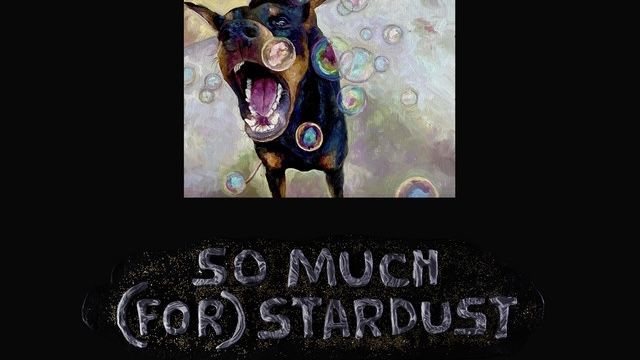'SO MUCH (FOR) STARDUST' COULD SAVE ROCK & ROLL
I don’t remember much of my life before I listened to my favorite bands. By the time I was 7 years old, I’m sure I had the entirety of Take This To Your Grave memorized, though I’m not sure I knew what all those words meant

I don’t remember much of my life before I listened to my favorite bands. By the time I was 7 years old, I’m sure I had the entirety of Take This To Your Grave memorized, though I’m not sure I knew what all those words meant. Now, at 26, I’ve been around for every new single, album, and video Fall Out Boy has put out for the past 20-odd years. As an old t-shirt once proclaimed, “I survived the hiatus (2009-2013).” Rising like the phoenix allegorized in their 2013 album Save Rock And Roll, Fall Out Boy has continuously one-upped themselves with each new release since their comeback. Though, I think the general consensus had been much more polarized until this point. Still, their newest installment, So Much (For) Stardust (2023) has remained the most profoundly impactful post-hiatus Fall Out Boy record to me as a diehard, life-long fan.
From the beginning of the album’s rollout, I could feel somewhere in my gut that this would take me back to the band’s roots, sonically and aesthetically. Fall Out Boy has never been interested in cashing in on fans’ nostalgia dollars. It’s crucial to acknowledge this as I analyze their most recent work, as it directly reflects their growth from past projects. Myself, and many of my peers, mused about the feelings we were sharing in these moments. It was as though nature was healing; the things we loved about the band were slowly starting to fall back into place.
I got to listen to So Much (For) Stardust a bit early, though I’m lost in Pacific Standard Time. Being involved in a community of fans means I have a number of outlets available to me when I’m just dying to get my hands on a new record. There were listening parties all across the country, and though I couldn’t make it to one, I still got my way “in.” My first experience with the record was via a bootleg an old friend of mine got at one of the listening events. I was weary to do it this way, but I realized that there is something magical within these iPhone voice memo recordings. You could hear the commotion of a few dozen strangers, all gathered together for a shared cause. You can hear chatter, reactions, and overwhelm as the cinematic choruses build throughout "Heaven, Iowa." The crowd gasps as they realize the lyrics say, “scar-crossed lovers,” as opposed to “star-crossed lovers,” and these finer details culminate into what makes the band resonate so deeply after all this time. You can hear giggles as the crowd is endeared by Patrick Stump’s commentary, knowing his personality well from watching his 20+ year career. Every awkward foot shuffle, laugh, cry, and moment of surprise was captured by these voice memo recordings. These are mmrs we’ll all look back on fondly 20 years from now, the way my older friends talk about basement shows of years past.
Every solo and group project Fall Out Boy has ever put out can be found within every note of So Much (For) Stardust. Fans who lost the plot after Mania (2017) rushed back in, headfirst slide, just after hearing the lead single "Love From The Other Side". It was immediately likened to Infinity On High (2007), with its punchy, distorted guitars, roaring drums, and unmistakable Pete Wentz lyricism. However, I was also reminded of the magic of hearing the orchestral introduction of "The Phoenix" for the first time. If there’s one thing Fall Out Boy has always been excellent at, it’s immersion. The first few seconds of opening Fall Out Boy tracks are a lot like the opening credits of a film. You’ll know if it’s for you if you can feel it in the spaces between your bones.
That is to say, of course, that the cinematic quality of Fall Out Boy records (especially this one) is largely due to Patrick Stump’s career as a film composer. Even when his most notable score was for The Incredible Hulk roller coaster at Universal Studios in Florida, fans of Stump’s discography could immediately recognize it as his work. Great musicians have such a distinct voice that it can be heard from a mile away, or over screams as riders glide across green, steel tracks at 67 mph. The same goes for songs like "Heartbreak Feels So Good", "Flu Game", and "I Am My Own Muse." An online friend agreed with me that such moments nod to the work of Danny Elfman, both in terms of Tim Burton films and Oingo Boingo records. This should be no surprise to fans of Fall Out Boy, since their points of reference have been consistent throughout their discography. Seriously, I am more surprised when Pete Wentz does not reference Terminator 2 or the Star Wars prequels. We have the latter in common.
I’ve seen all kinds of criticism towards Fall Out Boy over the years. This chameleon of a band changes its sound with each new drop— and yet people feign surprise every time. What never changes, though, is the undeniable skill the fourpiece has in terms of overall musicianship. So much has been said about Patrick Stump’s incredible vocal range, but he has outdone himself, clearly learning how to not only work his natural skill but maneuvering sound equipment in the studio to achieve the best possible result. There is a drastic leap in the overall vocal chain quality in So Much (For) Stardust versus Mania. The return of Neal Avron as the record’s producer was the exact right choice, but kudos should be sent towards Stump for his masterful use of technique.
The absence of Joe Trohman throughout the press for this record is felt heavily among fans, myself included. We all prioritize his healing, but this is some of his most profound guitar playing in Fall Out Boy’s discography. Like Stump’s composition, Trohman offers a distinct voice in his guitar playing that can only be found by a musician dedicating a lifetime to his craft. We implore Fall Out Boy to give Trohman the reins a bit more frequently, as his creative prowess is at the core of what the band means to the fans. His presence within the heavy metal community provides a perspective not often explored in a top-40 record. His work on the lead single alone was enough to get me excited about the direction.
Speaking of heavy metal, Andy Hurley’s drum performance is hard to beat. “The Animal,” as we have known him, is able to evoke certain emotions that cannot be portrayed simply with a melody and lyrics. Driven, focused, and empathetic, Hurley’s drumming drives the record home, keeping the stadium rock and roll feel while distinctly reminding fans of Fall Out Boy’s Chicago hardcore roots… even though Hurley is from Wisconsin. Apparently, at one point in the album, Hurley’s prowess shines through multiple drum kits in a single track. The seamless transitions throughout the kits surprise even Hurley’s most fervent supporters. Fans often refer to Andy as the heart of the band; his whimsy is encapsulated by polite silence followed by witty one-liners that fans recite back to him for years to come. His drumming offers similar sentiments.
As a musician myself, I’ll always list Wentz as my number one inspiration as a lyricist. That’s a given; 20 years later, and I’m still pleasantly surprised at wordplay like “scar-crossed lovers” in "Heaven, Iowa". One of the most emotional moments of the whole record was the track "Baby Annihilation". We were taken back to the early days of Pete Wentz spoken-word poetry, but it’s clear that Wentz has since spent hours in comfortable silence with his pen. His voice has matured in the most pleasant way. Plus, adding to Wentz’s knack for intimacy within his art, Wentz’s youngest child makes an appearance at the end of "The Kingtsugi Kid (Ten Years Later)", calling fans’ attention to the meaning of the song itself. Most importantly, it was simply a dang cute moment. What is more shocking than my love of Wentz lyrics is my love of his bass playing. His musicianship is sorely underrated; throughout all of So Much (For) Stardust, Wentz shines as a bassist. His most notable performance in the record is on the track "Hold Me Like A Grudge". I hope that new fans are inspired by its bassline like I was with "Dance, Dance" and take up the instrument, too.
Fall Out Boy feels like home to me. One could argue that, as a result, these opinions are inherently biased in favor of the band. On another, one should argue that my expectations are even higher than those of a casual listener. I’ll try on every new Fall Out Boy record for size, but I know not all of them will fit like a claymation glove. This time, I watched myself and everyone else around me fall in love with Fall Out Boy again— even 20 years later. This is not another Infinity On High, but it is the truest example of a modern-day Fall Out Boy record that they could have made for us.
Keep up with Fall Out Boy at https://falloutboy.com



